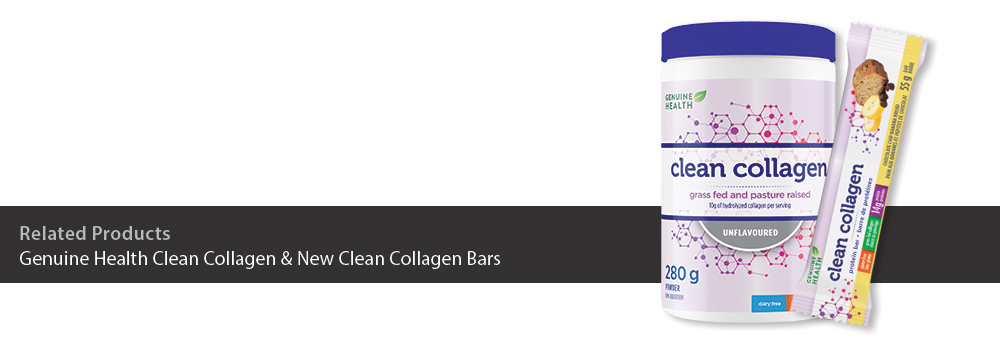

Top Collagen Questions, Answered
Collagen is HOT these days! With people singing its praises for promoting plump, youthful skin and strong joints, this protein powerhouse is really helping people feel and look their best. However, even with its soaring popularity, collagen is a relatively new player in the supplement field. Here are answers to the top eight questions about collagen to really understand what all the buzz is about.
QUESTION 1: If collagen is naturally occurring, why do we need to supplement with it?
Collagen is the most abundant protein in our bodies. Collagen is found in hair, skin, nails, ligaments, cartilage, tendons, bones and within blood vessel walls—all known as “connective tissue” in the body. Beginning in our 20s, however, our bodies start producing less collagen, making it important to add it as a supplement.
QUESTION 2: What is the best way to increase collagen?
Bone broth can be a great source of collagen, but there are two things to consider if we want to maximize its benefit. First, we want to make sure we’re taking bone broth on a regular basis. Second, we want to make sure it has consistent amounts of the amino acids that have been shown to be markers of collagen in the body. For that reason, we recommend that you take a collagen supplement because you can get a standardized amount that’s proven to provide benefit, and it’s easy to take every day.
QUESTION 3: What about bone broth supplements?
Studies show that commercially available bone broth powders show huge variability in collagen precursor amino acid content. Research shows that bone broth lacks consistency in the amounts of amino acids that are markers of collagen content (hydroxyproline and hydroxylysine) and those necessary for collagen production (glycine, lysine, proline, and leucine). Unless a product is “spiked” with extra leucine, bone broth does not provide enough leucine for collagen production.
QUESTION 4: What age should someone start taking collagen?
Since our bodies begin to produce less collagen in our 20s, we’d recommend taking a collagen supplement during that time. Many young adult athletes choose collagen for sports recovery, and others use collagen because of the research demonstrating anti-inflammatory properties and improved mental outlook.
QUESTION 5: Do hydrolyzed collagen peptides make it through the digestive acids of the stomach in order to benefit the skin?
This is a hotly debated topic, but researchers have found that the key peptides within collagen are absorbed intact from the GI tract and delivered to target tissue such as the skin. Studies in humans have found that the peptides in collagen peak in the blood after 2 hours but remain significantly elevated even after 4 hours. These small peptide units from oral collagen supplementation then provide the raw materials for human collagen production—for skin benefits like increased hydration, reduced visible signs of aging, and more.
QUESTION 6: I’ve heard that you should only mix collagen powder with cooler liquids (i.e. not hot coffee).
This is false. Hot water is one of the best known—and healthiest—ways to extract collagen peptides from their source. For example, when fish scales are heated in distilled water at 70 degrees, the collagen yield is only 6%… but when fish scales are heated to 100 degrees, the yield is 30%. So, keep on mixing your collagen in your hot liquid of choice!
QUESTION 7: Do collagen supplements really work, or do the collagen creams work better?
Despite the rationale for its use in skincare products, collagen is too big of a molecule to pass through the epidermis (the outermost layer of skin), let alone reach its target dermal layer. This is why most “anti-aging” topical creams are made with the individual components of collagen, like glycosaminoglycans (or GAGs) and hyaluronic acid, and not collagen.
QUESTION 8: What’s the best source of collagen?
The most important factor when choosing collagen is its absorbability. For optimal absorption, look for hydrolyzed collagen (aka collagen peptides). Look for a dose of collagen that’s 7-10 grams (most of the studies on collagen’s benefits have been in the 5-10 gram serving range). Finally, look for a collagen that mixes well and is easy to take because it’s important to take collagen every day to see the benefits!
Clean Collagen by Genuine Health is available in bovine or marine sources and provides 10 grams of hydrolyzed collagen per scoop. Genuine Health makes it easy to get your daily dose of collagen: clean collagen is available in unflavoured and lightly-flavoured water enhancers. NEW clean collagen bars provide 7 grams of collagen per bar and are available in two delicious flavours: Chocolate Raspberry and Chocolate Chip Banana.


References
Alcock RD, et al. Bone Broth Unlikely to Provide Reliable Concentrations of Collagen Precursors Compared With Supplemental Sources of Collagen Used in Collagen Research. Int J Sport Nutr Exerc Metab. 2018 Sep 26:1-8
Alcock RD, et al. Plasma Amino Acid Concentrations After the Ingestion of Dairy and Collagen Proteins, in Healthy Active Males. Front Nutr. 2019 Oct 15;6:163
Benjakull, et al. Impact of retort process on characteristics and bioactivities of herbal soup based on hydrolyzed collagen from seabass skin. J Food Sci Technol (2018) 55: 3779.
Paul, C.; Leser, S.; Oesser, S. Significant Amounts of Functional Collagen Peptides Can Be Incorporated in the Diet While Maintaining Indispensable Amino Acid Balance. Nutrients 2019, 11, 1079
Olatunji, et al. Temperature‐dependent extraction kinetics of hydrolyzed collagen from scales of croaker fish using thermal extraction. Food Sci Nutr 2017;5:1015-20
Liao, et al. Three Newly Isolated Calcium-Chelating Peptides from Tilapia Bone Collagen Hydrolysate Enhance Calcium Absorption Activity in Intestinal Caco-2 Cells. J. Agric. Food Chem. 2020 In Press
Yang, et al. Marine fish bone collagen oligopeptide combined with calcium aspartate increases bone mineral density in ovariectomized rats. Journal of Hygiene Research, 30 Jun 2019, 48(4):606-610
Zhu, et al. The effect of human-like collagen calcium complex on osteoporosis mice Materials Science and Engineering: C. 2018;93:630-639